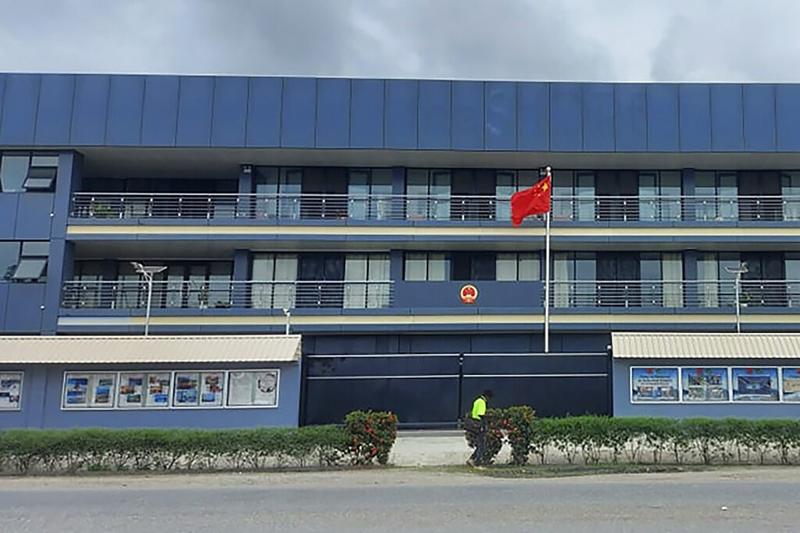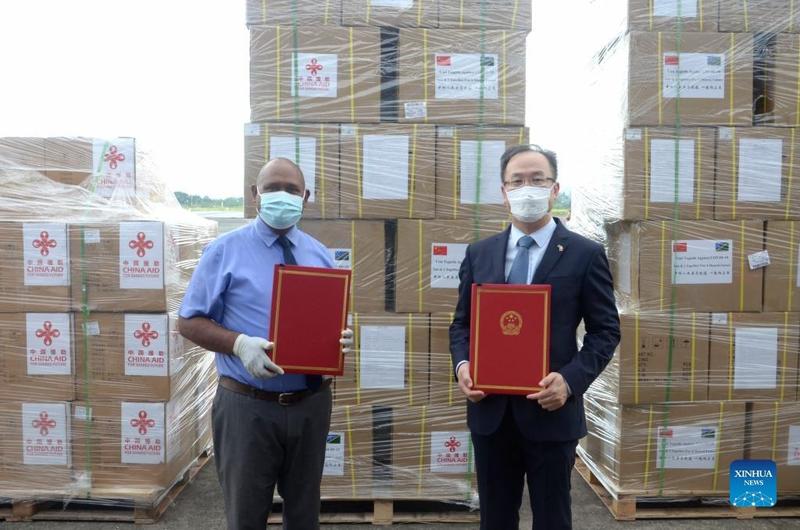 The Chinese national flag flies outside the Chinese Embassy in Honiara, Solomon Islands, April 1, 2022. (CHARLEY PIRINGI / AP)
The Chinese national flag flies outside the Chinese Embassy in Honiara, Solomon Islands, April 1, 2022. (CHARLEY PIRINGI / AP)
A proposed security pact between China and the Solomon Islands has drawn a great deal of criticism from Canberra and the usual right-wing commentators in Australia, despite the fact that the agreement targets no third parties and benefits people of both sovereign nations.
The Solomon Islands government said on March 31 that officials from China and the Solomon Islands had “initialed” a draft agreement. “The draft framework agreement will be cleaned up and await signatures of the two countries’ foreign ministers,” a statement issued by the Solomon Islands government’s communications unit said on March 31.
Australia, New Zealand and the United States have all raised concerns about the deal, but the Solomon Islands said it would continue to uphold its foreign policy of “friends to all and enemies to none”.
Solomon Islands Prime Minister Manasseh Sogavare said any new agreement with China will have no impact on agreements already in place with Australia and New Zealand
Solomon Islands Prime Minister Manasseh Sogavare, in an impassioned speech to parliament on March 29, said there was “no intention whatsoever to ask China to build a military base in the Solomon Islands” as had been reported earlier by the Australian media.
“Where does that nonsense come from? The security treaty ... is pursued at the request of the Solomon Islands’ government,” Sogavare said.
“We are not pressured in any way by our new friends.”
He said any new agreement with China will have no impact on agreements already in place with Australia and New Zealand.
“Relations with our traditional allies such as Australia and New Zealand will always remain important to us,” he told parliament.
With an election due in Australia in May, Australia’s Prime Minister Scott Morrison, who is struggling in the opinion polls, is using security as an election issue.
READ MORE: Solomon Islands' PM says China ties to boost development
The announcement on March 29 that Canberra intends to spend A$65 million ($48.6 million) to build a new High Commission, or embassy, in the Solomon Islands capital Honiara was seen by some as an attempt to counter China’s perceived growing influence in the region.
Australia’s official development assistance to the Solomon Islands declined 12.8 percent from A$179 million in 2014-15 to A$156 million in the 2021-22 budget, government figures show.
Canberra is convinced, without any evidence, that China wants to establish a naval base in the Solomon Islands, which are located some 2,000 kilometers off the northern Australian coast.
Tarcisius Tara Kabutaulaka, an associate professor and director of the University of Hawaii’s Center for Pacific Islands Studies, said he doubted that China intends to build a naval base in the Solomon Islands.
 Chinese Ambassador to the Solomon Islands Li Ming (right) and Solomon Islands Minister for Health and Medical Services Culwick Togamana pose for a photo in Honiara, capital of the Solomon Islands, on Feb 18, 2022. (THE CHINESE EMBASSY IN SOLOMON ISLANDS / HANDOUT VIA XINHUA)
Chinese Ambassador to the Solomon Islands Li Ming (right) and Solomon Islands Minister for Health and Medical Services Culwick Togamana pose for a photo in Honiara, capital of the Solomon Islands, on Feb 18, 2022. (THE CHINESE EMBASSY IN SOLOMON ISLANDS / HANDOUT VIA XINHUA)
“Foreign military outposts are not how Beijing operates. It currently has only one overseas base in Djibouti in the Horn of Africa. This is in contrast to the United States, with an estimated 750 bases in 80 countries,” he said in an opinion piece written for Sydney-based think tank The Lowy Institute.
His words were echoed by Professor James Laurenceson, director of the Australia-China Relations Institute, at University of Technology Sydney, who said the reaction from Canberra was not “justified”.
Foreign military outposts are not how Beijing operates. It currently has only one overseas base in Djibouti in the Horn of Africa. This is in contrast to the United States, with an estimated 750 bases in 80 countries.
Tarcisius Tara Kabutaulaka, associate professor and director of the University of Hawaii’s Center for Pacific Islands Studies
“If the draft agreement is an indication of what the final agreement will be, then there are a whole lot of people in Canberra who are jumping three steps ahead of where the cooperation between the Solomon Islands and China is actually at,” Laurenceson told China Daily.
“This is standard practice now,” he said, referring to Canberra immediately projecting its “worst fears onto what appears to be a modest agreement”.
“Every step of the draft requires Solomon Islands’ request or consent. Just because the memorandum of understanding is signed, we are not at the point where it gives China the freedom to do whatever it wants … it just isn’t the case.”
And he added: “The Solomon Islands is an independent, sovereign nation and is free to determine who it partners with.”
ALSO READ: Solomon Islands to 'benefit from comprehensive ties with China'
Tess Newton Cain, project leader of the Pacific Hub at the Griffith Asia Institute at Griffith University, Queensland, said Sogavare appears “very bullish” about the benefits this agreement will bring to the Solomon Islands and its people.
She said Sogavare was also taken aback by the reaction to the proposed agreement, especially in Australia, calling the reaction “insulting”.
“He has no intention of changing the agreement with Australia or downgrading it in anyway,” she said.
China’s Foreign Ministry spokesperson Wang Wenbin said on March 29: “Normal law enforcement and security cooperation between China and Solomon Islands, two independent countries, is consistent with international law and customary international practice.
"We hope relevant countries will earnestly respect Solomon Islands’ sovereignty and its independent decisions instead of deciding what others should and should not do in a condescending manner.”
At a regular briefing on March 31, Wang specified three points. First, security cooperation between China and Solomon Islands is based on equality and mutual benefits.
Second, the bilateral security cooperation agreement aims to deepen bilateral cooperation in such areas as maintaining social order, protecting people’s lives and property safety, humanitarian assistance and natural disaster relief. It is conducive to keeping the society of Solomon Islands stable, promoting regional peace and stability and increasing the common interests of regional countries.
Third, the security cooperation between China and Solomon Islands does not target any third parties, is not in conflict with Solomon Islands’ cooperation with other countries, and complements the existing cooperative mechanisms in the region.
“Pacific island countries offer a big platform for international cooperation and should not be seen as the “backyard” of some country, still less an arena for major-power rivalry,” Wang said.
Sogavare on March 29 described concern from “many leaders” over China’s presence threatening regional security as “unfortunate perceptions”.
He said it was “very insulting ... to be branded as unfit to manage our sovereign affairs” by other nations, and he condemned those who had leaked the draft pact with China as “lunatics and agents of foreign regimes”.
The Solomon Islands was rocked by unrest last November when protesters tried to storm the parliament and then went on a deadly three-day rampage, torching much of Honiara’s Chinatown.
More than 200 peacekeepers from Australia, Fiji, Papua New Guinea and New Zealand were deployed to restore calm.
The unrest was sparked by a range of tensions in the Solomon Islands, including opposition to Sogavare’s rule, inter-island rivalries and high unemployment, but anti-China sentiment in the nation also played a key role.


